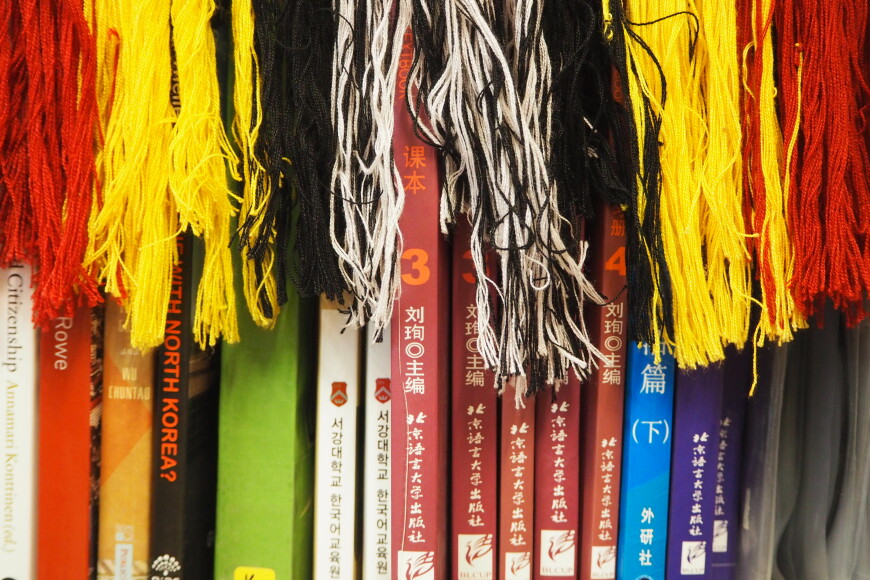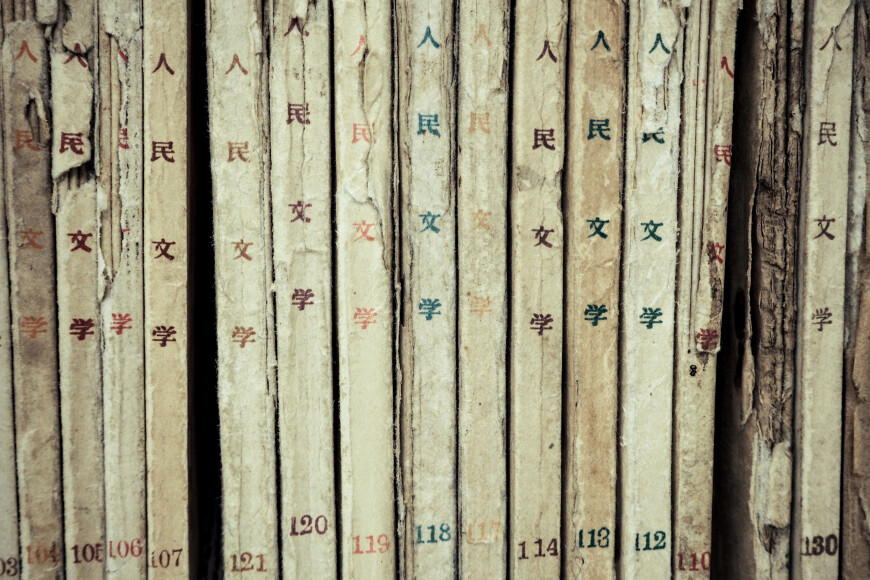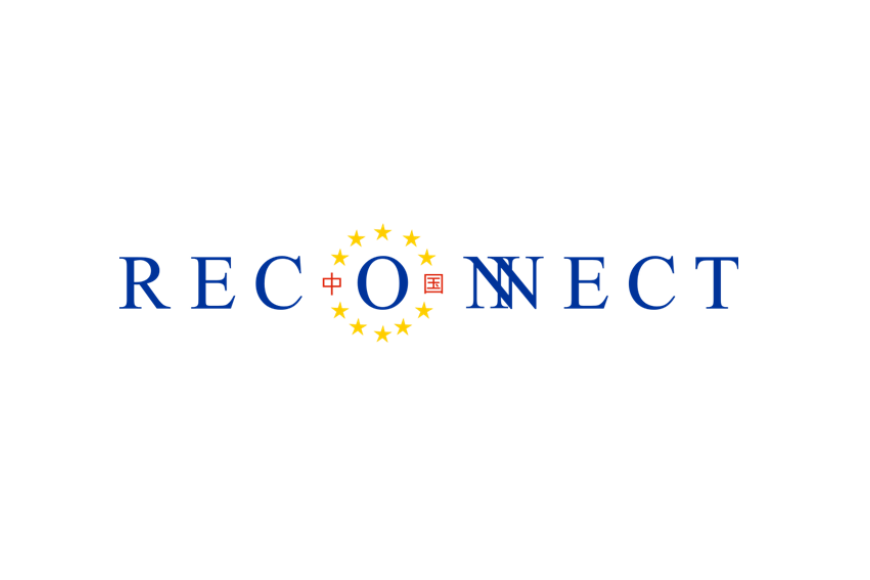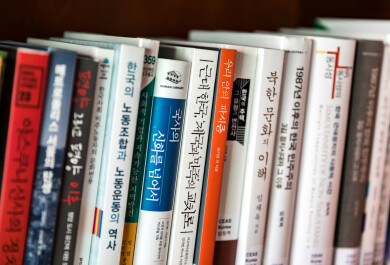The Centre for East Asian Studies (CEAS) is the only academic research centre in Finland that focuses on contemporary East Asia from the perspective of social sciences in both research and teaching. CEAS was established in 2006 but the minor programme in East Asian Studies has been offered since 1998.
CEAS has research and teaching expertise especially in politics, sociology and contemporary history of the region with a focus on China, South Korea, North Korea and Japan. CEAS offers three different study programmes (minor, master's and doctoral level) and also coordinates the Finnish University Network for Asian Studies (Asianet).
News and Events
The next application period for the Master's Degree Programme in East Asian Studies (EAST) starts on 7 January 2026 and ends on 21 January 2026. You'll find further information and updates here. We look forward to your application!
Guest lecture by Dr. Minyoung Kim, Yonsei University, Seoul/South Korea titled “Mourning, Resistance, and Festivity: “Disaster Generation” and Protest Affect in South Korea” on 22 Jan 2026 (Thu), 12-14hrs, Pub309.
Abstract: In December 2024, then-President Yoon declared martial law in South Korea, shocking both the Korean public and the global community. Mass protests followed, first to oust and arrest him, then to build a new Korean society. Meanwhile, the demonstrations were noted for their “festive” character: young Koreans, mostly women, brought K-pop fanlights and flags, while singing cheerful songs. This presentation moves beyond the peripheral festivity to analyze the complex affects of everyday resistance carried by these young protesters. Who are they, and what changes do they bring to the affective landscape of Korean political protests—protest affect? Based on in-depth interviews with 15 participants (early twenties to mid-thirties), I argue that mourning and aspirations for a more just society for the marginalized underpinned the protests. Many cited the 2014 Sewol ferry disaster, which claimed 304 lives, as their moment of political awakening and a motivation for direct action. Others pointed to socially inflicted deaths associated with intensifying misogyny and homophobia, such as the 2016 murder near Gangnam Station. For those already navigating a violent, discriminatory, and precarious society threatening their lives and human dignity, the martial law declaration was shocking only in that it made explicit what had long been implicit. The protesters brought their cultural practices—celebrating diversity, memes, and K-pop—that had been sustaining their lives into offline struggles against the far-right forces. Beneath the festive surface lies deep-rooted mourning for unjust deaths and visions for a more inclusive, dignified Korean society for everyone.
Short bio: Dr. Minyoung Kim is the inaugural NEST (Nordic–Lund Emerging Scholars Teaching Program in Korean Studies) Scholar at the Centre for East and South-East Asian Studies, Lund University. She is currently a lecturer at Yonsei University and earned her Ph.D. in Sociology from the University of California, Irvine in 2024. Her dissertation, “From Personal Grief to Social Action: Bereaved Families’ Activism in Neoliberal South Korea,” examines how individuals who lost family members to disasters gradually become social movement actors, seeking systemic change to enhance public safety. Her articles have been published in several peer-reviewed journals, such as the Journal of Korean Studies, Sociological Perspectives, and Situations. Her article, “Evolving Emotion, Situated Context, and Movement Activism,” won the 2024 Graduate Paper Award from the American Sociological Association’s Sociology of Emotions Section.
The Nordic Asia Podcast is a podcast series co-hosted by Nordic Institute of Asian Studies (NIAS) in Copenhagen and its partners in the Nordic countries, including the Centre for East Asian Studies (CEAS) at the University of Turku. Experts join us in every episode to share their insights about timely topics within Asian Studies.
Check out the latest episodes of the Nordic Asia Podcast here:
Ready to dive into the world of Korean literature?
Join us for an inspiring journey through powerful novels, lively discussions, and sharing of your own stories.
This semester we focus on mental health and Korean society by reading Sehee Baek’s “I want to die but I want to eat tteokbokki”.
We will meet two sessions and discuss mental health issues in order to raise the mental issue problems in the society and to understand social issues related to in individuals.
We also cook and eat tteokbokki together!
Our Book Club is waiting for you—don’t miss it! Limited spots available.
- Who can join? Students, teachers, researchers, and staff—all are welcome!
- Want credit? By completing extra assignments (EAST0210 Korean Literature Workshop), you can earn one.
- Time and Place
Fri 6.2.2026 10–12 Educarium Library 2nd Floor, Montessori (Assistentinkatu 5)
Fri 13.3.2026 10–12 Medisiina D, Aistikattila (Kiinamyllynkatu 10) - REGISTER via webropol: https://link.webropolsurveys.com/EP/F26667B117DB162E
Once you’re registered, you will get the information about where books are. And at the first meeting, there is an introduction to the book.
Book trigger warning: This book contains mental health issues including depression, anxiety, self-harming, and emotional distress.
Some sections may trigger for readers who have experienced similar kinds of issues. Please seek for a mental health professional in case of uncomfortable at any point.
For help, check therapy navigator at Varha https://vanha.terapianavigaattori.fi/
For students, call 046 710 1073 if you need any help from YTHS (Mon–Thu 8–15, Fri 8–14)
This project is supported by Academy of Korean Studies.
Are you ready to embark on a captivating journey through the pages of thought-provoking novels, engaging
discussions, and shared stories? Look no further, our Book Club awaits you! You can read in Korean or any other translated languages! In 2025 Autumn, we start with Nobel Prize Winner Han Kang's book <Human Acts>. You may recommend books you want to read together as well.
Date: Thursday, 23 October 2025, 14:00-16:00
Thursday, 20 November 2025, 14:00-16:00
Location: Educarium Library 2nd Floor Montessori (subject to change according to the number of participants)
Who can join: students, teachers, researchers, staff, professors, everyone is welcome!
For UTU students, you can get a credit by doing extra assignments (EAST0210 Korean Literature Workshop).
Coffee/Tea and light snacks will be served.
Join us now by filling out the registration form here.

On 14th November 2025, the 2025 Korean Writing Competition was held at the Centre for East Asian Studies, University of Turku.
Among the 18 applicants, 12 people participated in the competition.
Professor Lauri Paltemaa opened the opening speech and wished the good luck to the participants before the competition started.
Three referees (Dr. Jeong-Im Hyun, a scholar in Korean Studies; Boram Jung, an essay book writer and a translator; Hae Seong Kim, a secretary at the Embassy of Republic of Korea in Finland) reviewed the participants' texts.
The referees' general review emphasized how the participants' texts were amazingly nice.
The event was supported by the Academy of Korean Studies, the Korean Embassy in Finland, and Yeppo & Soonsoo.
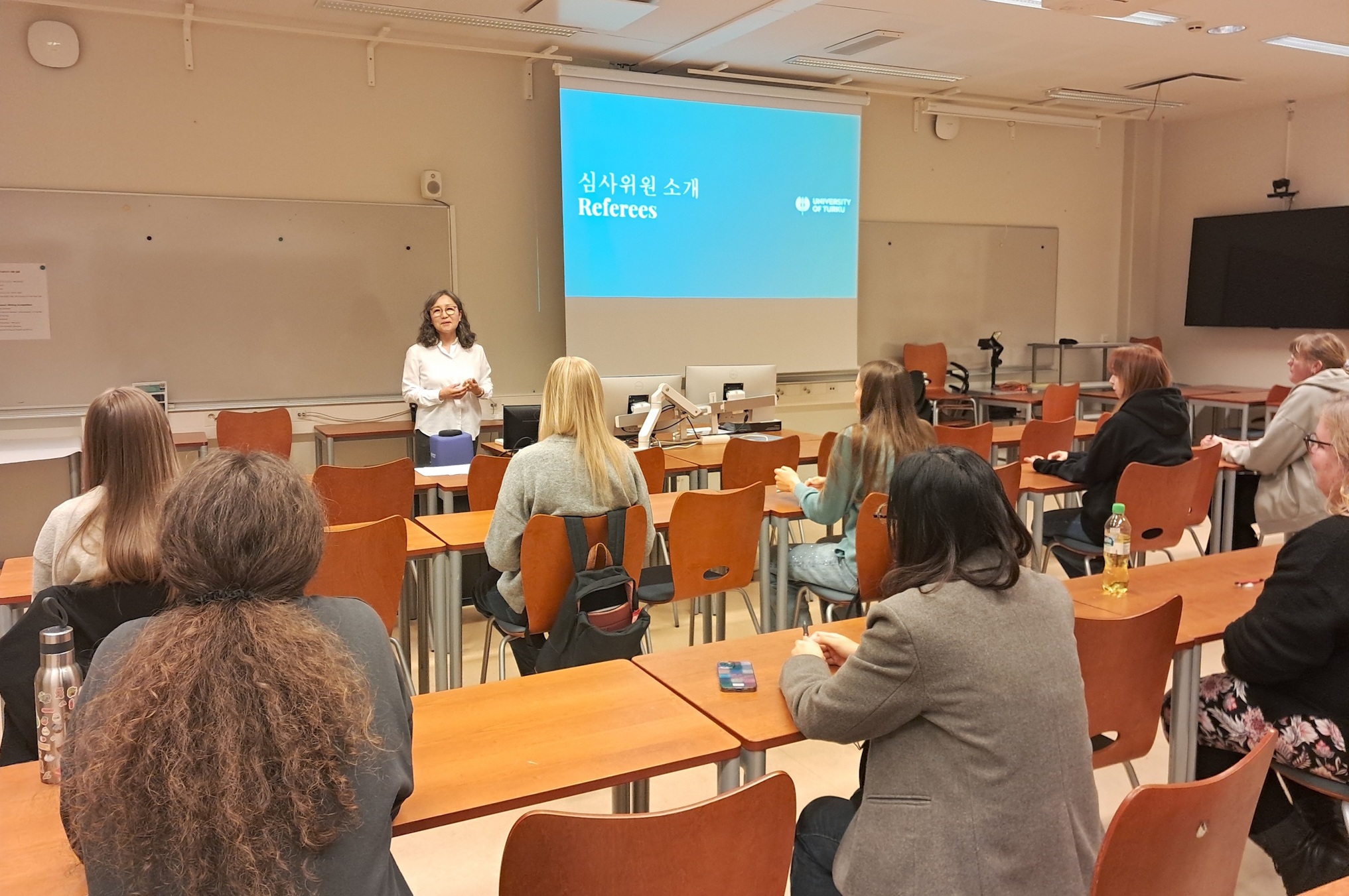
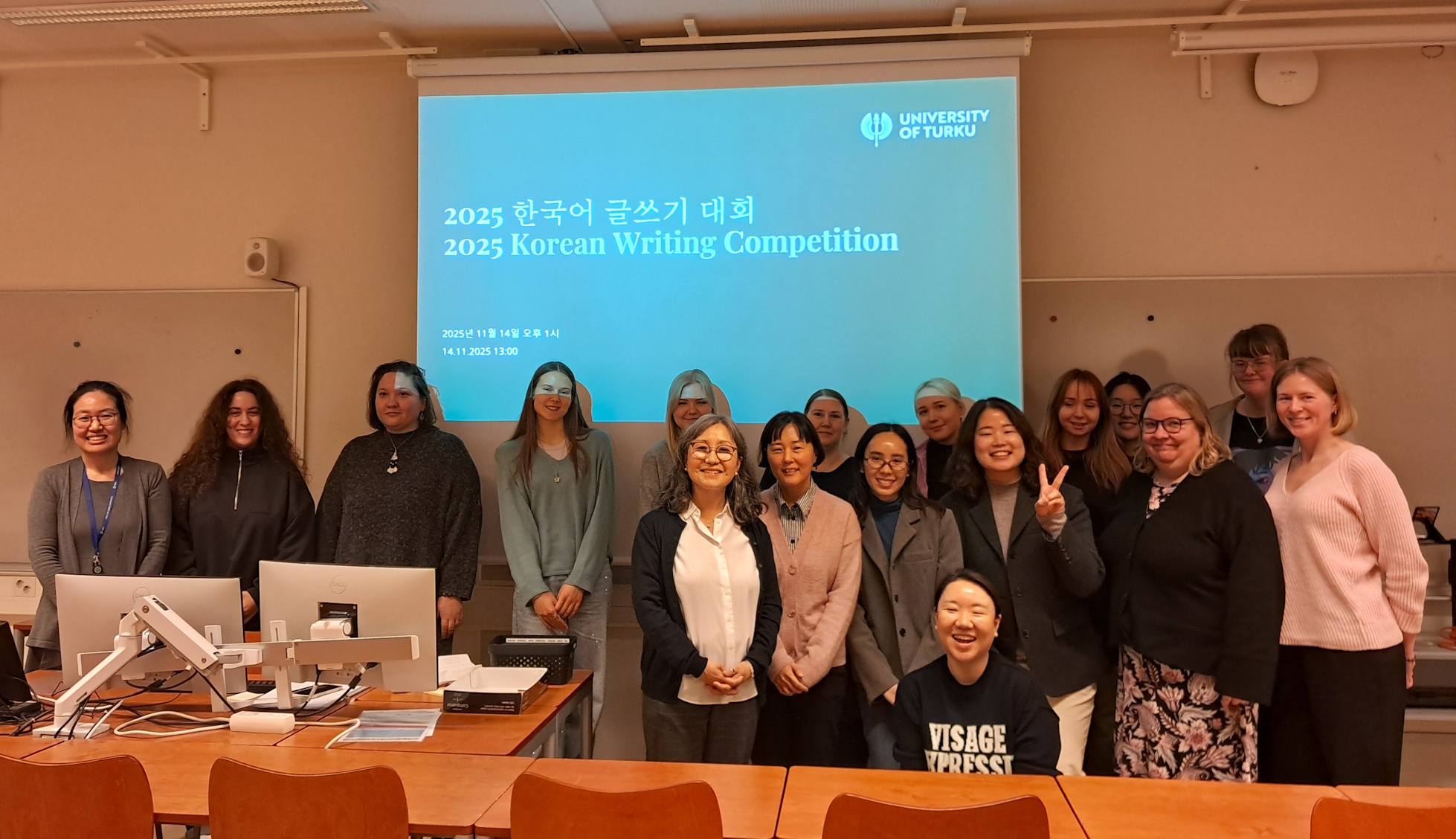
2025 Korean Writing Competition (한국어 글쓰기 대회) will be held at Centre for East Asian Studies (CEAS) at University of Turku.
2025 Korean Writing Competition (한국어 글쓰기 대회)
- Time: Friday 14.11.2025 at 13.00–16.30
- Place: Pub126, Publicum, University of Turku
- Eligibility: anyone who loves writing in Korean. Minimum age from a student in upper secondary education or age 16.
- Maximum participants: 27 people
Participants will come to the event venue physically sitting and writing a short essay on the topic given.
Participants can choose a topic and will write about it at the competition.
- For beginners: My room, my house, or my neighbourhood (내 방, 우리 집, 우리 동네)
- For intermediate learners: My favourite food, travel experience, or hobby (내가 가장 좋아하는 음식, 여행 경험, 취미)
- For advanced learners: Korean culture and my daily life (한국 문화와 나의 일상)
Travel Grant
Centre for East Asian Studies, University of Turku will provide travel grant up to 30 euros for competition participants who fulfil all the following qualifications
- who applied and accepted for the Korean Writing Competition
- attends and writes in the competition on 14th November 2025
- is registered as an unemployed jobseeker or a student in upper secondary education or higher education in Finland
- does not live in Turku region
- grant reimbursement will be paid only to a Finnish bank account
Apply: Please apply to this link: https://link.webropolsurveys.com/EP/BA5E9B6812686EE2
This event is supported by Academy of Korean Studies, Embassy of the Republic of Korea in Finland, and Yeppo&Soonsoo.
9th Annual Conference of the Social Science Korean Studies Network in Europe (SoKEN)
“Democratic Resilience and Social Movements in South Korea: Challenges and Future Prospects”
9–10 April 2026, Turku
The current global socio-political landscape is marked by the growing influence of extreme right-wing movements that challenge democratic norms and values. Even nations long regarded as models of advanced democracy have not been immune to this reactionary wave. Against this backdrop, South Korea offers a compelling case of civic engagement and democratic resilience. The active responses of Korean citizens in times of political crisis demonstrate how democratic principles can be revitalized and defended when under threat, providing valuable lessons of global significance.
By situating South Korea’s experience within a broader comparative framework, this conference seeks to stimulate new perspectives on how democracy can be strengthened and sustained in the face of internal and external challenges. The theme highlights Korea’s pivotal role as a democracy navigating both domestic pressures and global transformations. South Korea stands as one of Asia’s most dynamic democracies, facing complex domestic and international challenges. This conference seeks to explore how democratic resilience is expressed through civil society, activism, and social movements. By focusing on these dimensions, the conference aims to foster a deeper understanding of Korea’s evolving political, social, and cultural landscape.
Scope and Topics
We welcome paper proposals from across the social sciences—broadly defined to include sociology, political science, anthropology, economics, communication, and related disciplines within area studies such as East Asian and Korean Studies. While the main theme centers on democracy and social movements in South Korea, we also encourage submissions that explore any aspect of contemporary Korean society.
Eligibility
The conference warmly welcomes submissions from young scholars and PhD students, as well as established academics.
Funding Support
Participants whose papers are accepted will be offered up to two nights of accommodation in Turku. In addition, modest travel funding may be available, depending on budget availability.
Submission Guidelines
Please submit an abstract of 250–300 words, along with a short bio (max. 100 words), to il.g.lee@utu.fi by 9 February 2026, 17:00 (Helsinki time). Notifications of acceptance will be sent by early March 2026.
Contact information:
Ilgyu Lee Centre for East Asian Studies (CEAS), University of Turku Email: il.g.lee[a]utu.fi
3-4 November 2025
University of Turku
The ongoing war in Ukraine has unsettled energy supplies, disrupted trade and food security, and intensified questions of security and diplomacy. Its repercussions are being felt across Asia — from Central Asia’s vulnerabilities to East Asia’s strategic calculations, from South Asia’s economic challenges to Southeast Asia’s shifting alignments.
The Asian Studies Days 2025 examines these complex ripple effects. It highlights how global crises intersect with local realities, shaping the lives, policies, and futures of Asian societies.
Special attention will be given to Central Asia, marking the expansion of the Asia Network’s focus on this region. Responding to the growing demand for knowledge on Central Asia, the Network will launch new courses on the region next year.
The programme features a keynote on the multiple challenges faced by Central Asian countries today, followed by a panel discussion with leading experts on Asia, who will explore the diverse responses of Asian countries to the war. In addition, the programme includes a hands-on workshop on ‘AI for Asian Studies’, introductions to new Asia-related projects and networks, as well as a seminar for doctoral researchers.
Join us for a timely exploration of how the war in Ukraine is redefining Asia’s political, economic, and social landscape.
Preliminary Programme (subject to changes)
MONDAY, NOVEMBER 3
9.30-12:00
AI for Asian studies hands-on workshop
13-16.30
Keynote by Dr Asel Doolotkeldieva, Research Fellow, University of Potsdam
Panel discussion on responses of Asian countries to the war in Ukraine
Chair: Prof Lauri Paltemaa, Centre for East Asian Studies, University of Turku
Panelists:
Dr Asel Doolotkeldieva, Research Fellow, University of Potsdam
Dr Agnieszka Małgorzata Nitza-Makowska, Research Fellow, University of Tartu Asia Centre
Dr Kamila Szczepanska, University Lecturer, Centre for East Asian Studies, University of Turku
Short introductions Asia- related projects and networks
TUESDAY, NOVEMBER 4
9-16:00 Doctoral seminar
More information about the doctoral seminar and registration behind this link
Click here for registration and details of Asian Studies Days 2025
Conspiracy Theories, Anti-Science, and Disinformation in East Asia: Perspectives from Japan (CADEA) - KONE Foundation (Grant Year 2024) (Project period: 2025-2027)
Docent Dr Szczepanska Kamila and Docent Dr Yoko Demelius
https://koneensaatio.fi/en/grants-and-residencies/conspiracy-theories-anti-science-and-disinformation-in-east-asia-perspectives-from-japan-2/
Course “Post-Growth Era Japan: Globalization, Neoliberalism, and National Identity”
Course description
Under these circumstances, it is crucial to take a comprehensive view of the problems Japan has faced since the end of its high-growth period and the country's responses. This lecture series (16 x 2h) will examine how Japanese society has attempted (or been compelled) to revamp various social and cultural systems, such as security, employment, labor culture, and religion, following the collapse of the “bubble economy.” It will also explore how these changes have affected people’s lives and consciousness from multidisciplinary perspectives.
EPEL Talk by Dr. Codruţa Sîntionean, Babeş-Bolyai University, 22 Sept 2025 (Mon), 12-14hrs, Pub126 (funded by AKSE)
Summary: Under Park Chung Hee’s regime, excessive emphasis on modernization, rushed construction projects, and a misguided understanding of heritage preservation had a massive impact on heritage conservation. The lecture presents a series of eye-opening examples of heritage practices that were common under the Park rule. Ideology prevailed over concerns for authenticity, which led to astonishing practices such as displacement, alteration, demolition, partial or complete reconstruction of centuries-old historic architecture, simply in order to illustrate the historic and ideological narrative disseminated by the government. In order to fully grasp the extent of state intervention in the remaking of national heritage, the audience will take a look at stunning photographs from the 1960s and 1970s, selected from the archives of the Office of Cultural Properties.
Bio: Dr. Codruţa Sîntionean is assistant professor at the Department of Asian Languages and Literatures at Babeş-Bolyai University in Cluj-Napoca, Romania. She has been in charge of the section of Korean Language and Literature since its creation in 2008. She is the author of several journal articles on Korean heritage management practices and the co-editor of “Invented Traditions in North and South Korea” (2021).
Finnish Universities’ Research Scholarships to the Fudan Nordic Centre – apply by 19.5.2025
Read the full Call for Applications and instructions on how to apply from here: 2025 Call Research Scholarships_FNC_pdf.
Nordic Centre at Fudan University, Shanghai will offer the grantees office space and some support services. Nordic Centre at Fudan University was established in 1995 through a collaborative effort between 14 Nordic universities and Fudan University.
Today the network consists of 24 member institutions in China, Denmark, Finland, Iceland, Norway and Sweden. Nordic Centre seeks to be an essential hub for cutting-edge Sino-Nordic research, research-based education and outreach activities. Currently the Nordic Secretariat of the Fudan Nordic Centre is coordinated in Island by the University of Island.
For more information, please refer to http://www.nordiccentre.net/ and documents there. This scholarship programme is a specific project coordinated by the University of Turku and funded by the Kone Foundation. The current project is running until 2028.
Are you a student of the Korean language? Would you like to share your skills with others and improve your speaking? If so, we invite you to participate in our 2025 Korean Speech Contest at the University of Turku!
📅 Date: Friday, 25 April 2025, 13-15.30 pm
📍 Location: Calonia Cal2 (2106), Calonia building 2nd floor, UTU
🎤 Who Can Join? Students of Korean at any level! You do not have to be a university student to participate.
🔹 How to Register: Please fill out this registration form to participate in the contest. The first twenty registered participants will be admitted in the order of registration.
🔹 Deadline: Deadline for the registration is 11 April (23:59).
Welcome everyone! This is a great chance to upgrade your Korean skills – don’t miss it! *^^*
Click here to find more information
If you have any questions, feel free to contact Taru Salminen at taru.u.salminen@utu.fi
EPEL Talk by Seunghwan Ryu, Free University Berlin, 16-18hrs, Pub209 (funded by AKSE)
Summary: Rooted in Juche Ideology, which emphasizes self-mastery and independence, self-reliance has long been recognized as a fundamental principle of North Korea. However, this perception has often overshadowed Pyongyang’s cooperation with foreign countries to achieve self-reliance on an international scale during the later phase of the Cold War. This lecture examines North Korea’s collaboration with African nations, particularly Tanzania, to promote collective self-reliance within the postcolonial Cold War context. While North Korea and African states forged diplomatic ties and pursued anti-imperialism in the 1960s, Pyongyang actively engaged in rural Tanzanian agriculture to advance this initiative in the 1980s.
Compared to its military training programs and monumental statues provided to various African countries, North Korea’s agricultural initiatives—aimed at fostering food security and economic independence—have received relatively little scholarly attention. These efforts were particularly significant in the context of the global food crisis and widening inequalities between the Global South and North, which fueled calls for a New International Economic Order in the 1970s. After joining the Non-Aligned Movement in 1975, North Korea sought to promote its agricultural and rural development abroad, particularly through adopting the controversial “Juche farming method.” While Western diplomats expressed skepticism toward this approach, Pyongyang established Agro-Science Research Institutes in Guinea and Tanzania and dispatched experts to develop localized farming techniques tailored to African conditions.
Despite financial and technological limitations, North Korea’s agricultural initiatives aligned with the urgent needs of African countries struggling with chronic food shortages and a lack of self-sufficiency. Drawing on historical analysis of North Korea-Tanzania agricultural cooperation, this lecture introduces the concept of “Self-Reliance Internationalism” to explore how marginalized actors in Asia and Africa pursued international cooperation to counter the rise of neoliberal globalization in the final stage of the Cold War.
Bio: Seung Hwan Ryu is a Doctoral Fellow at the Graduate School of East Asian Studies, Freie Universität Berlin. His research discusses international cooperation between North Korea and Tanzania during the Cold War, examining how they practiced the idea of self-reliance in food production and agricultural development. He holds a BA in History and Economics from Sogang University, South Korea, and an MA in Global Studies from the University of Vienna and Leipzig University. His article “Between Second and Third World: North Korean Use of “Imagined Affinity” in the Socialist Globalization Project with Regard to Tanzania,” was recently published in the global history journal Comparativ (2023).
https://utu.zoom.us/j/64219223038 Meeting ID: 642 1922 3038 Passcode: 940899
EPEL Talk by Dr. Dan Gudgeon, University of Vienna, 16-18hrs, Pub209 (funded by AKSE)
Summary: This lecture explores how the North Korea nuclear program’s meaning has changed according to the recognition the DPRK receives internationally as North Korea and the U.S. went from being enemies during the Cold War, to two states that could sign the Agreed Framework and make preparations to normalize relations, before returning back to a state of extreme enmity. At several key points during this process, the DPRK re-constructed the meaning of nuclear weapons domestically and attempted to incorporate those changes into their biographical narrative. In recent years, Pyongyang has found itself in a contradictory spot whereby nuclear weapons provide stability in sustaining a biographical narrative of autonomy, while undermining stability in preventing wider international recognition. The lecture provides insights into processes of change and the importance of language in international relations in general and in the DPRK-U.S. relationship specifically.
Through the lecture, students should be able to question or explore essentializing tendencies in international relations, how actors construct meaning to fit into espoused biographical narratives, and how even something as bluntly material as nuclear weapons is always mediated through language.
Bio: Dan Gudgeon is a post-doctoral researcher and lecturer in the Department of East Asian Studies at the University of Vienna, Austria. He completed his Ph.D. at the University of North Korean Studies in Seoul, where he was a recipient of a Ministry of Unification scholarship. He previously worked for the inter-Korean peacebuilding and humanitarian cooperation NGO, the Korean Sharing Movement, on peace education and international cooperation projects.
https://utu.zoom.us/j/61915966497 Meeting ID: 619 1596 6497, Passcode: 123124
CEAS is honored to welcome Japan’s Ambassador to Finland, HE Takashi Okada, to the University of Turku to discuss on topic:
“Japanese Foreign and Security Policy in the Changing Global Security Situation”
Time and place: Thursday 27.2.2025 at 14.15-15.45, Educarium, Edu3
Assistentinkatu 5, University of Turku
You are most welcome!
No pre-registration required.
Please note that photos will be taken at the event.
November 14-15, 2024, Tampere University
In a multipolar world, where power and influence are dispersed across multiple nations, Asia stands as a critical region to study. With its diverse economies, complex geopolitical dynamics, and growing influence in global governance, understanding Asia is essential for addressing the “wicked problems” of our time—issues like climate change, economic inequality, and technological disruption. Asian countries play a major role in shaping the global economy, environmental policies, and security frameworks.
For Finland, comprehending this shifting global landscape is especially important. The country must navigate the complexities of a world where global power balances are in flux. By deepening our understanding of Asia, we can better analyse the evolving global landscape, contribute to problem-solving initiatives, and engage responsibly in the increasingly complex international environment.
Arranged in cooperation between Tampere University and the Finnish University Network for Asian Studies.
Navigating the Nexus: South Korean Foreign Policy, Domestic Dynamics, and Deterrence Strategies in a Changing International Environment
Seminar at the University of Turku, October 3rd, 2024, 9-12.30
How does South Korea navigate its foreign policy in a changing international environment? What role does domestic politics play? How do we need to understand the extended deterrence strategy, also from a comparative perspective (East Asia and NATO)? This seminar discusses the interplay between South Korea’s foreign policy, domestic politics, and external strategies. Join us and discuss these and related questions with leading IR scholars from the University of Seoul in South Korea.
The seminar is organized by the Centre for East Asian Studies, University of Turku, and co-sponsored by the Centre for East Asian Studies, University of Turku, and the Department of International Relations, University of Seoul.
Welcome!
Date: Thursday, 3rd of October, 2024, 9.00-12.30
Venue: University of Turku, Educarium building, Assistentinkatu 5, Turku. Lecture hall EDU2, hybrid event (Zoom invitation is sent to registered participants before the event)
Register to the event by October 1, 2024: https://link.webropolsurveys.com/S/7282B72AE8CF3853
Seminar Program
9.00 coffee
9:15 Opening words
Prof. Lauri Paltemaa, Centre for East Asian Studies, University of Turku
9:30 – 10.15 "Korean foreign policy in a changing international order"
Professor Seokwoo Kim, PhD, University of North Carolina at Chapel Hill, former president of Korean Association of International Studies, IR and IPE major.
10.15 – 11.00 "Korean domestics politics and Korean foreign policy"
Professor Sunghack Lim, PhD, Pennsylvania State University, former president of Korean Political Science Association, Korean Politics and Comparative Politics major
11.00-11.15 short break
11.15 – 12.00 "Extended deterrence strategy: Comparison between NATO and East Asia"
Professor Jiwhan Hwang, PhD, University of Colorado, Boulder, advisor to the Department of Unification, Security Studies, and Inter-Korean Relations major
12:00 Closing remarks
Speakers’ Bios
Seokwoo Kim is a Professor in the Department of International Relations at the University of Seoul. He received a B.A. in the Department of French Language and Literature from Seoul National University and his M.A. in Political Science from IOWA State University, and his Ph.D. in Political Science from the University of North Carolina. Professor Kim’s research interests include International Political Economy and International Political Science. He has published articles including "A Journal of Our Own Making", "Theories and Realities of FTA Formation between Korea and Canada", "Evaluating the Korean Bargaining Power: The Case of the Financial Crisis in 1997", and so on.
Sunghack Lim is Professor of International Relations at the University of Seoul. Before joining UOS in 2004, Professor Lim served as Researcher Professor at the Center for Leadership, Yonsei University. He received a B.A. in Political Science and a Ph.D. in Political Science from Pennsylvania State University. Professor Lim’s current research interests focus on Political Parties and Election in Korea, Political Economy, with a particular emphasis on East Asia, Political Finance, Governance and so on, He has published on several topics including: Democratization and Economic Development in Korea and Taiwan, Political Finance during the General and Presidential Elections, and so on.
Hwangji Hwan is a Professor in the Department of International Relations at the University of Seoul. He received a B.A. in Diplomacy from Seoul National University and his M.A. in Political Science from Seoul National University and the University of Colorado. He received a Ph.D. in Political Science from the University of Colorado. Ji Hwan Hwang’s research interests include diplomatic policy and the relationship between South and North Korea. He has published articles including "The Paradox of South Korea’s Unification Diplomacy: Moving beyond a State-Centric Approach", "The Two Koreas after U.S. Unipolarity: In Search of a New North Korea Policy", The Political Implications of American Military Policy in Korea: Learning from Theoretical and Empirical Evidences" and so on.
The Nordic Korean Studies Days (NKSD) were founded by the universities of Copenhagen, Helsinki, Oslo, Stockholm, and Turku. Due to its huge success, this international teaching collaboration was expanded to include teachers and students from universities in the Baltics. The (new) Nordic-Baltic Korean Studies Days (NBKSD) are co-organized by scholars from the universities in Copenhagen, Helsinki, Kaunas, Oslo, Riga, Stockholm, Trondheim, and Turku. It is an intensive Korean Studies course covering different disciplines such as history, cultural studies, anthropology, sociology, and political science.
The Nordic-Baltic Korean Studies Days (NBKSD, 5 ECTS) create synergies of the rich knowledge and academic competence dispersed over small Korean studies units in the Nordic and Baltic countries, strengthen teaching collaboration between the participating universities, and further strengthen the academic community in the field of Korean studies. By combining various teaching and learning formats as well as innovative pedagogical approaches, the course provides multidisciplinary Korean studies, including, but not limited to, humanities, social sciences, and international relations.
Organizers in 2024: Sabine Burghart (University Lecturer, Turku), Erika Griučkaitytė (Vytautas Magnus University), Sonja Häussler (Professor, Stockholm), Zoran Lee Pecic (Associate Professor, Norwegian University of Science and Technology), Antti Leppänen (Researcher, Turku), Andrew Logie (Associate Professor, Helsinki), Ildze Šķestere (The University of Latvia), Vladimir Tikhonov (Professor, Oslo), Barbara Wall (Associate Professor, Copenhagen).
The next Nordic-Baltic Korean Studies Days will be organised in 2025.
Book on China's political system nominated as the Scientific Book of the Year by the Finnish Association for Scholarly Publishing. CEAS' professor Lauri Paltemaa is one of the authors together with Prof. Mikael Mattlin and Prof. Juha A. Vuori.
Kiinan poliittinen järjestelmä -kirja on ehdolla vuoden tietokirjaksi!
CEASin professori Lauri Paltemaa on yksi Kiinan poliittinen järjestelmä -kirjan kirjoittajista yhdessä tutkimusprofessori Mikael Mattlinin ja professori Juha A. Vuoren kanssa.
Suomen Tiedekustantajien liitto arvioi kirjaa nimityslausunnossaan näin: "Perusteellinen, loogisesti etenevä kokonaisuus, joka toimii hyvin paitsi oppikirjana myös tieteellisenä yleisteoksena. Kirjassa on tiivistetty erinomaisesti Kiinan historiallinen ja ideologis-poliittinen tausta, joka on luonut maan poliittisen järjestelmän ja muokannut sitä. Teos kuvailee Kiinan hallintorakenteen ja sen kehityksen yksityiskohtaisesti, mutta selkeästi. Järjestelmän nykytilan ja tulevaisuuden haasteiden jäsennelty kuvaus tuo Kiinan lähemmäs suomenkielistä lukijaa." Kirjan on kustantanut Vastapaino.
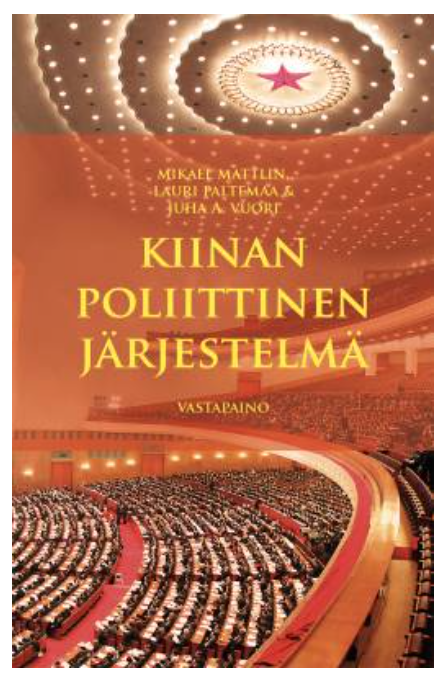
The CEAS' Finnish language MOOC Johdatus Itä-Aasiaan (Introduction to East Asia) was selected course of the year 2022 at the University of Turku!
Congratulations to Silja Keva and her team! The University of Turku (UTU) and the Student Union of the UTU selected the MOOC-course Johdatus Itä-Aasiaan (Introduction to East Asia) as the course of the year 2022. The course is produced by the Centre for East Asian Studies for the national Finnish University Network for Asian Studies.
The selection arguments highlighted the inspiring and versatile study materials of the course, the varied and flexible assignments, and their good interplay with the course textbook. The course received excellent student feedback.
Johdatus Itä-Aasiaan is a Finnish-language MOOC course that is free of charge and open to everybody. The course introduced the key issues and challenges of East Asian (China, Japan, South and North Korea) countries in politics, economy, social issues, and regional relations.
See below how to sign up for the course (for Finnish speakers)!
-------------
Johdatus Itä-Aasiaan -MOOC-verkkokurssi on Turun yliopiston vuoden 2022 opintojakso!
Turun yliopisto ja Turun yliopiston ylioppilaskunta valitsivat Itä-Aasian tutkimus- ja koulutuskeskuksen ja Yliopistojen Aasia-verkoston -verkkokurssin “Johdatus Itä-Aasiaan” vuoden opintojaksoksi 2022.
Valintaperusteita kuvattiin näin: ”Johdatus Itä-Aasiaan -MOOC-verkkokurssi oli innostava, kaikille avoin itseopiskelukurssi. Kurssilla oppimista tukivat omassa aikataulussa suoritettavat pienet ja vaihtelevat tehtävät, joiden yhteyteen oli merkitty arvioitu kesto. Erilaiset tehtävät nivoutuivat kurssin oppikirjaan ja monipuoliseen verkkomateriaaliin. Kurssisivuston visuaalinen ilme lisäsi motivaatiota. Opiskelijapalautteet kurssilta olivat kiittäviä.”
Johdatus Itä-Aasiaan on kaikille avoin ja ilmainen massaverkkokurssi. Tällä kurssilla opit ymmärtämään Itä-Aasian yhteiskuntien avainpiirteitä ja keskeisimpiä haasteita, jotka määrittävät alueen maiden (Kiina, Etelä-Korea, Pohjois-Korea ja Japani) nykypolitikkaa, talouksia ja maiden välisiä suhteita.
Kurssi perustuu oppikirjaan nimeltä Lohikäärme, tiikeri ja krysanteemi – johdatus Itä-Aasian yhteiskuntiin. Erilaiset verkossa suoritettavat tehtävät tukevat ja täydentävät oppikirjaa ja auttavat opiskelijaa soveltamaan ja pohtimaan oppimaansa. Kurssi on kokonaan suomenkielinen.
Kurssille kirjautuminen: Syksyn 2022 kurssille voi kirjautua 3.10 -20.11.2022 aikana. Kurssia voi suorittaa ajalla 3.10-18.12.2022.
Kirjaudu kurssille osoitteessa: https://digicampus.fi/course/index.php?categoryid=240
Tervetuloa mukaan!
CEAS, together with a European consortium, secured a four-year, four-million Euro EU Horizon grant to collaborate on ReConnect China, a path-breaking research project to address the lack of China knowledge in Europe and the urgent need to upgrade and promote independent European knowledge on contemporary China. There were more than a dozen applications for funding under this Horizon call, and ReConnect China consortium involving CEAS is one of only two selected. Starting from November 2022, the project aims to clarify in which domains the EU’s cooperation with China is desirable, possible, or impossible. Ghent University in Belgium will coordinate the work of 14 universities and knowledge centres in 12 European countries, of which UTU is the only Nordic University.
According to Professor Lauri Paltemaa, in the current geopolitical situation, China is increasingly identified as a rival, so it’s imperative to carve out a fair, balanced, and mutually beneficial European policy vis-à-vis China. This task will be supported by a tailor-made database collecting data from government sources, both at the national and local levels. Professor Lauri Paltemaa also emphasised the importance of getting a better understanding of what’s going on beyond Beijing, in provincial cities and villages. The project breaks new ground by linking this new digital repository with computational methods of data collection and analysis. Paltemaa ensures that CEAS researchers are well prepared to utilise the collected data to their full, as CEAS has, in a pioneering manner, initiated training for students and staff members in computational research methods.
CEAS will also co-lead one of the consortium’s work packages, aiming to produce Massive Open Online Courses (MOOCs) for European students. University lecturer Outi Luova, who is in charge of the development of the MOOC courses, describes this as an extraordinary opportunity to contribute to the development of Chinese studies in European universities. Based on the robust experience of CEAS in four much-praised MOOC courses via the Finnish University Network for Asian Studies, the aim of ReConnect is to provide introductory courses in Chinese politics, society, and economy that are easily accessible. Outi Luova points out that the excellent scalability of the MOOC courses and their efficient ability to mainstream China-knowledge among university students and the general public were one of the key aspects that secured the funding.
In addition to creating and disseminating knowledge about China for Europe and its citizens, Senior researcher Hermann Aubié with researchers from CEAS and the ReConnect Consortium will deliver policy briefs, podcasts and workshops to inform the strategic priorities of the European Union and the Commission in key EU-China issue areas such as green and digital technology, human rights, geoeconomics, global health, development financing, foreign aid, and the nexus between China’s domestic politics and international relations. As China researchers are often scattered all over Europe, this project also intends to bring them together, with policy experts, students, and other key stakeholders through a new Europe-China Knowledge Forum. To sum up, the five main outputs of the ReConnect China project are:
1. Providing an independent understanding of China and its overall defining social, cultural, political, and economic characteristics.
2. Identifying the EU’s current strengths and urgent needs within the new global narratives on China.
3. Developing a database of online open sources enabling day-to-day insights into policies, narratives, and public discourses in China.
4. Mainstreaming knowledge on China within the EU to help offset the stagnating number of European students in Chinese studies, while enhancing awareness on China among the general public and youth.
5. Contributing fact-based knowledge in four key policy fields: Science & Technology, Economy & Trade, Domestic Politics, and China in the World.
CEAS is very much looking forward to the official kick-off of this highly interesting new research endeavour in the company of excellent European partners!

This book, authored by Mikael Mattlin, Lauri Paltemaa, and Juha A. Vuori, offers a comprehensive analysis of China's political system (in Finnish).
Based on the latest research, the book provides its readers with a key terminology to understand Chinese politics. It deals with relations between the state and society, the role of the state in the economy, and China's foreign policy. The book also presents the key political institutions of the People's Republic of China, their historical backgrounds, and functional features.
Kiinasta on muodostumassa globaali poliittinen mahtitekijä, jonka vaikutus näkyy myös Suomessa.
Kiina on vaurastunut ja voimistunut, mutta Kiinan autoritaarinen poliittinen järjestys ei muistuta länsimaiden toimintatapoja. Siksi on oleellista ymmärtää Kiinan poliittisen järjestelmän perusteet ja sen toimintaperiaatteet.
Kiinan poliittinen järjestelmä on ainutlaatuinen yhdistelmä keisarillista menneisyyttä, leninististä (jälki)totalitarismia ja nykyaikaisia julkisjohtamisen oppeja. Sen toiminnassa korostuvat sekä muodolliset puoluevaltion instituutiot että epämuodolliset poliittisen kulttuurin piirteet.
Kirja tarjoaa lukijalleen uusimpaan tutkimukseen perustuvan keskeisen käsitteistön Kiinan politiikan ymmärtämiseksi. Siinä käsitellään valtion ja yhteiskunnan välisiä suhteita, valtion roolia taloudessa sekä Kiinan ulkopolitiikkaa. Kirjassa esitellään myös Kiinan kansantasavallan keskeiset poliittiset instituutiot, niiden historialliset taustat ja toiminnalliset piirteet sekä tutkimuksessa käytetyt keskeiset käsitteet.
Kirjoittajat ovat Kiinan tutkimuksen asiantuntijoita: Mikael Mattlin on Turun yliopiston valtio-opin professori. Lauri Paltemaa on Turun yliopiston Itä-Aasian oman aikamme historian ja politiikan professori sekä Itä-Aasian tutkimus- ja koulutuskeskuksen johtaja. Juha A. Vuori on Tampereen yliopiston kansainvälisen politiikan professori.
Saatavilla myös e-kirjana. https://vastapaino.fi/sivu/tuote/kiinan-poliittinen-jarjestelma/3858480
The second revised edition of "Lohikäärme, tiikeri ja krysanteemi - - Johdatus Itä-Aasian yhteiskuntiin", the Finnish texbook for studying contemporary East Asia, is now out!
You can purchase the electronic and printed versions of the book from Utu-shop.
LOHIKÄÄRME, TIIKERI JA KRYSANTEEMI – Johdatus Itä-Aasian yhteiskuntiin
Kirjoittajat: Silja Keva (toim.), Annamari Konttinen, Kristian Kurki, Lauri Paltemaa ja Sungju Park-Kang
Lohikäärme, tiikeri ja krysanteemi tarjoaa johdatuksen Kiinan, Etelä-Korean, Pohjois-Korean ja Japanin historiaan ja näiden tämän hetken polttavimpiin yhteiskunnallisiin ja taloudellisiin haasteisiin. Kirjassa käsitellään mm. nopeasti ikääntyvän väestön vaikutuksia Japaniin, Kiinan politiikan ja hallinnon erityispiirteitä, ja Koreoiden tilannetta. Lisäksi kirjassa valotetaan tämän yhden maailman dynaamisimman alueen keskinäisen yhteistyön ongelmakohtia, joita historialliset jännitteet edelleen vaikeuttavat.
Kirja sopii kaikille kansainvälisistä aiheista ja Itä-Aasiasta kiinnostuneille ja Itä-Aasian opintoja aloittaville opiskelijoille.
Kirjoittajat toimivat tutkijoina ja opettajina Turun yliopiston Itä-Aasian tutkimus- ja koulutuskeskuksessa, joka on Suomen ainoa Itä-Aasian nyky-yhteiskuntia yhteiskuntatieteellisestä näkökulmasta tutkiva akateeminen yksikkö.
Kirja on jo myynnissä e-kirjana Turun yliopiston UTUShopissa 10€ hintaan.
UTUShopissa on myös myynnissä painettu teos 15€ hintaan.
We are delighted about the Academy of Finland's decision to fund the Security in China research consortium led by CEAS Professor Lauri Paltemaa and Professor Juha A. Vuori from the University of Tampere. More information on the project webpages:
Security in China (in English)
Turvallisuus Kiinassa (in Finnish)


